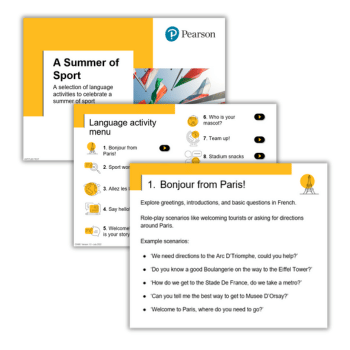Languages Are A Life Skill – Four Ways To Develop A Love Of MFL For Secondary Students

Students able to speak another language will find doors opening across the globe in all sectors, and it is our job as educators to make MFL magical

If you read the press, MFL is one of the hardest subjects that students can take at GCSE and A level.
Some say there is a crisis in MFL where the terminal assessments now resemble something that most practicing Language teachers completed at the end of their A2, certainly not for GCSE!
Ultimately it is a subject within most educational establishments across this green and pleasant land and students are inspired to opt for it because they like it and see the value in taking a language to GCSE and beyond.
Languages are a life skill and being able to operate with success will, without a doubt pay dividends, opening doors across the globe in all sectors and it is our job as educators, teachers and TAs to make it magical so they develop the love of languages and linguistic learning.
1. Know your students
Engaging students in learning and ensuring progress is the ultimate challenge isn’t it? So as teachers we plan, in departments we plan together in teams and triads adopting a lesson study approach and we consult and collaborate with our TAs adjusting our plans to ensure the learning activities are appropriate don’t we? We do. And we know, ‘the best laid plans oft go awry’.
Knowing our students is key to this, if we know them we plan for them, we create experiences that will engage them, excite them and ultimately have them wanting more. Data is great but students are more than data and we have to create experiences which draw them in, are risk free but which evoke curiosity with every engaging step.
Knowing our students beyond the data helps us to plan appropriate experiences so when we dangle the hook, they bite. Language lessons can be like fishing if you just have the right bait on the end of your rod. Take the time to get to know their likes, dislikes and what makes them tick and you’ll definitely have them engaged because your bait will be perfect.
2. Connection first, learning second
Meeting and greeting is the simplest but greatest launch to any lesson, of course it is. You welcome learners hot, sweaty and tie-less from PE or in deep thought from philosophy, but this is your time to welcome them in to your learning environment whether it’s an IT room, your classroom or a temporary base.
Take the time to welcome each and every one of them to your domain because it allows you to catch up with them, to make them smile, to give them a fresh start and ultimately to acknowledge them as individuals and check they are ready for the next stage in their learning journey.
With all checks complete, you know your class are present and who are ready for learning but also who might need a more sensitive and supported approach throughout the lesson so they all achieve success. Simple yet always effective right?
3. Taking the stress out of speaking
Students don’t always like speaking in front of their peers yet they have to. Participation will develop their communication skills as well as their confidence, accuracy and spontaneity yet reticence can remain high.
Speaking in the target language should be an integral part of lessons with teachers and lead learners taking the time to warm up students who have just come from a range of other non-MFL based subjects.
Giving thinking time is critical before asking students to speak in front of peers, we demand this in written responses yet don’t always gift it when oracy is the skill.
Don’t forget the pause part of the brilliant strategy; Pose, Pause, Pounce, Bounce to avoid embarrassment and groans!
4. Fun, fancy dress and sock puppets
Fun in lessons – is this real learning? Of course it is! There is no greater compliment than when students say ‘Oh no Miss,’ as I ask them to pack up ‘is that the time?’ They have been so deeply engaged in learning developing their skills and making connections to previously learnt knowledge that they have lost track of time. Brilliant!
We aren’t entertainers but creating memorable learning experiences is increasingly important with the shift to terminal assessment. Drama, role play, fancy dress and sock puppets can be easily employed to help students engage in low-stress speaking activities developing key skills in a memorable and awe inspiring way in MFL.
I know what you are thinking and, yes, as the teacher you absolutely have to dress up and get involved too. If you don’t, how can you expect your students to? Crista Hazell is a subject leader for MFL, has been teaching for 19 years and is a national council member of the Association for Language Learning (ALL) and an associate for Independent Thinking. She blogs about the adventures in her classroom at cristahazell.wordpress.com and is on Twitter @CristaHazell. She also contributed to There Is Another Way: The Second Book of Independent Thinking by Ian Gilbert.











